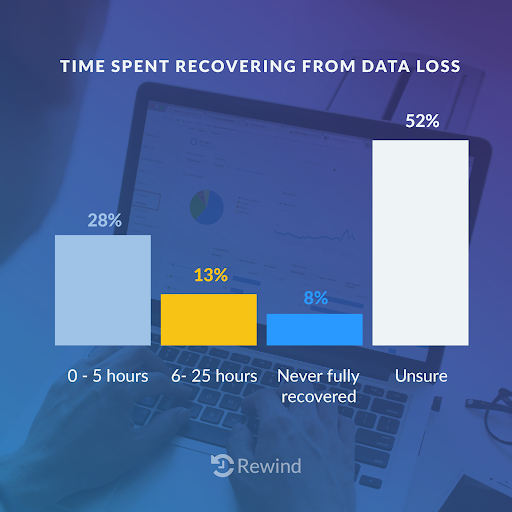Ecommerce is revolutionizing how we buy and sell goods and services. Businesses invest a lot of time and energy to build out the perfect ecommerce store. And it goes beyond images and product listings. There’s inventory, blogs, themes, navigation, customer order information, product reviews and more. All this critical business data allows merchants to provide better service and grow their sales.
But what happens if it all went away in the blink of an eye? As with anything online, data disasters are prone to happen without warning. When the store goes down unexpectedly, it can be devastating to a business.
According to the 2020 Data Protection Survey Report, 25% of respondents have lost essential data, and nearly eight percent of respondents never fully recovered their lost data. And here are some more stats which paint the picture of how the average ecommerce store operates:
- 70% of respondents have five or fewer employees
- Half of respondents said Ecommerce accounts for 100% of sales
- For small businesses, every hour is precious. A total of 28% of respondents responded that it took up to 25 hours to restore their lost data.

These are a lot of stats to digest, so let’s break them down a bit. What does this all mean? These are small businesses working in a variety of industries, such as fashion, food, department stores, entertainment, communications, technology, cosmetics, and sports and leisure. They have few staff and limited resources. Cash flow is highly dependent on digital sales. Every hour spent recovering data is an hour spent not producing revenue.
“Our website is run (designed/coded/maintained) by just one person – me – and if things go wrong, we lose sales and we may even lose customers, and that’s on me,” – response from When The Store Goes Down: 2020 Data Protection Survey
Whisker Seeker Tackle, is the largest manufacturer of cat-fishing equipment in the USA. With products available in over 470 stores, it is an amazing feat for a company with five employees. Even with a presence in traditional stores, the bulk of Whisker Seeker’s main business is done online. Almost 80%, of it, actually.
With Black Friday on the horizon, Whisker Seeker accidently deleted their entire catalog. All 300 stock keeping units (sku’s) and every photo, off their ecommerce site. With $120,000 worth of Black Friday sales in jeopardy, it took the team over 70 hours to redo their product images for over 100 SKUs and post them online.
Whisker Seeker has a product turnaround time of only two days. Those 70+ hours restoring their lost data is 70+ hours of time not spent fulfilling orders, answering customer questions, executing marketing campaigns, and preparing shipping and delivery logistics.
“If I had known ecommerce platforms do not provide full backups and can’t restore your site, I would have been using a backup solution from day one,” – Matt Davis, Owner, Whisker Seeker
It is not the responsibility of the ecommerce platform to provide backup and recovery solutions. That falls squarely on the shoulders of the merchant. Almost 60% of respondents to the 2020 Data Protection Survey never backed up their site before implementing a data protection strategy. And 9% had trusted their ecommerce platform to protect them.
Unforeseen downtime can heavily cost a company. Here is what some of the respondents had to say about the impact of downtime:
“Enormous amounts of time were expended creating my entire online store. The thought of having to start all over again is mind-shattering.”
“We would have to rewrite product titles, descriptions and all the SEO search terms and then find and add back product photos”
“We had to literally hand count our entire inventory and re-input.”
“It Took hours to get the products, photos, inventory all set up, as well as the pages and navigation. I wouldn’t want to have to do that all over again.”
“I’m on my own. So rebuilding pages, navigation, trying to track down customer information, etc, it would feel like having to rebuild the company.”
“I would have to spend a lot of time fixing the issues. I would not be able to produce my products in time, since mostly everything on my store is handmade and made-to-order”
“I would lose $5000 a day”
To find out more about the online risks an ecommerce business faces, and the most commonly lost store sections, the full 2020 Data Protection Survey Report can be downloaded for free.



